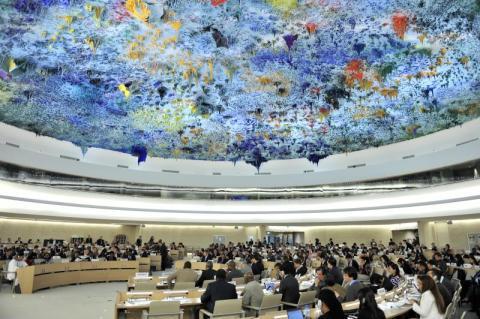
On July 17, 2025, Alkarama submitted its contribution for the fourth cycle of the Universal Periodic Review (UPR) of Lebanon, which will take place in Geneva from November 3 to 14, 2025 before the United Nations Human Rights Council. This report, highlighting violations of fundamental rights documented since the last 2020 cycle, addresses relevant recommendations to the Lebanese authorities.
The UPR is a mechanism of the Human Rights Council that examines, every four to five years, the human rights situation in each UN member country. In this context, Alkarama contributed to Lebanon’s evaluation based on its years of documentation and advocacy work.
Torture, judicial repression, and inhumane detention conditions
In its report, Alkarama denounced the persistence of torture, despite its prohibition under national law and Lebanon’s international commitments. Torture remains commonly used, especially during police custody, to obtain confessions. In 2024, Alkarama submitted to the UN Subcommittee on Prevention of Torture a report highlighting the systematic nature of these practices, as well as the inaction of the National Preventive Mechanism, which has been legally established since 2016 but remains non-operational.
Alkarama also raised alarms about inhumane detention conditions, particularly at Roumieh prison. In January 2024, two inmates died there due to lack of medical care, despite calls from Alkarama and other NGOs. Earlier in the year, Alkarama had demanded urgent measures to address prison overcrowding and the deterioration of health services.
On the judicial front, Alkarama denounced the systematic use of military courts to try civilians, including activists, journalists, and lawyers, in violation of the right to a fair trial. Alkarama recalled the emblematic case of lawyer and human rights defender Mr. Mohamed Sablouh, who has been targeted by threats and harassment due to his anti-torture activism.
Abusive restrictions on fundamental freedoms
Alkarama also highlighted the increase in violations of freedom of expression and the right to peaceful assembly. Journalists, lawyers, activists, and ordinary citizens have been prosecuted or arrested for expressing critical opinions, notably on social media. The Cybercrime Bureau has summoned many individuals for remarks deemed offensive or defamatory, in a climate of growing repression.
Finally, Alkarama criticized the anti-terrorism legislation adopted in 2015, which is based on a vague and particularly broad definition of terrorism, opening the door to arbitrary arrests, prolonged detention without trial, and violations of basic procedural guarantees.
Urgent call for reform
Through this contribution, Alkarama emphasized the urgent need to align Lebanese legislation with international standards, ensure judicial independence, protect human rights defenders, and restore monitoring and remedy mechanisms concerning deprivation of liberty.
Alkarama called on the Lebanese authorities to take concrete structural measures to end impunity and effectively protect fundamental rights.
